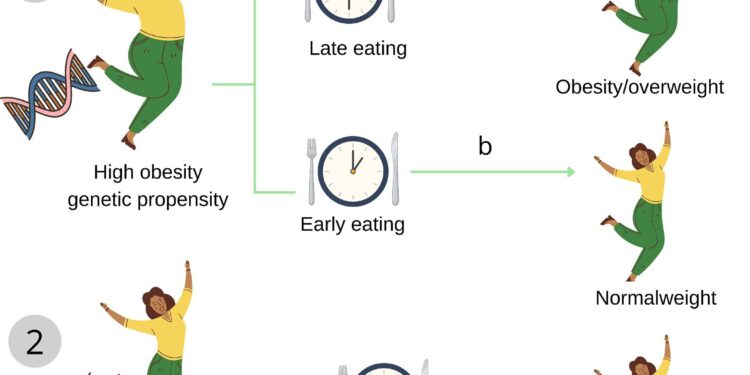Graphic summary. Credit: Obesity (2025). DOI: 10.1002 / OBY.24319
Researchers led by the University of Madrid report that consumption earlier in the day Assaissin the weight gain provided by a high genetic score for obesity.
The meal moment drew attention to the associated effects on metabolism, energy expenditure and circadian alignment. Zeitgeber, a body phenomenon that occurs rhythmic which acts as a signal in the regulation of circadian rhythms of the body, can also synchronize metabolic tissues such as liver, pancreas and adipose tissue.
Changes in the food moment can change the zeitgeber, resulting in a change in the molecular moment of circadian clock signals and, therefore, rhythms in metabolic function.
Peripheral oscillators in metabolic organs and sensitive tissues at food can become synchronized from the central clock, which is very sensitive to environmental light. The hypothesis is issued that such internal circadian disalling can contribute to unwanted cardiometabolic traits and obesity.
In the study, “the timing of early meals attenuates a high polygenic risk of obesity”, published in ObesityThe team carried out linear regression analyzes to test whether the synchronization of meals interacts with a polygenic score on the genome scale on the BMI and the long -term weight loss maintenance.
Participants included 1,195 adults with overweight or obesity (average age 41 years, 80.8% of women) registered in six clinics of weight loss across Spain through obesity, nutrigenetics, calendar and the Mediterrane (on time), which combined a behavioral weight treatment of 16 weeks) with a post-treatment assessment at around 12 ± 3 y).
Investigators calculated a polygenic risk score for BMI from monocleotide monometric polymorphisms and evaluated the time for meals. The median point of the contribution of meals was calculated as time halfway between the first and last meals of a participant, weighted during the week and on weekends. Linear regression models adjusted for age, gender, clinic site and the main components of ancestry.
Each hour of a subsequent median point corresponded to 0.952 kg / m2 Higher basic BMI and a 2.2% increase in body weight at 12 years (± 3 years) after treatment. In the highest priced polygenic risk, the BMI climbed approximately 2.21 kg / m2 for each hour of meal delay. No association appeared in lower risk groups.
The authors conclude that the meal calendar is associated with the maintenance of weight loss and moderates the genetic risk, which suggests that early food could be part of the personalized obesity interventions.
Written for you by our author Justin Jackson, edited by Sadie Harley, and verified and revised by Robert Egan – This article is the result of meticulous human work. We are counting on readers like you to keep independent scientific journalism alive. If this report matters to you, please consider a donation (especially monthly). You will get a without advertising count as a thank you.
More information:
R de la Peña – Armada et al, the calendar of early meals reduces a high polygenic risk of obesity, Obesity (2025). DOI: 10.1002 / OBY.24319
Divya Joshi et al, Timing Matters: Early Eating reduces genetic sensitivity to obesity, Obesity (2025). DOI: 10.1002 / OBY.24350
© 2025 Science X Network
Quote: Eat earlier linked to the success of long -term weight loss (2025, August 5) recovered on August 5, 2025 from
This document is subject to copyright. In addition to any fair program for private or research purposes, no part can be reproduced without written authorization. The content is provided only for information purposes.



